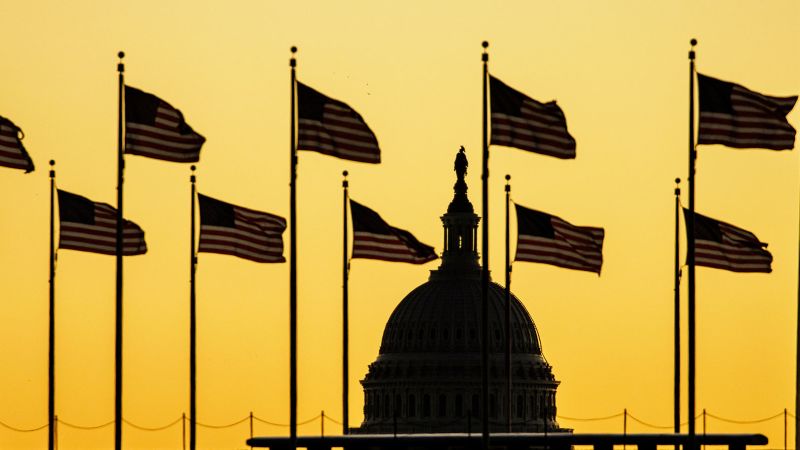

A version of this story first appeared in CNN Business’ Before the Bell newsletter. Not a subscriber? You can sign up right here. You can listen to an audio version of the newsletter by clicking the same link.
New York
CNN Business
—
Democrats and Republicans in Congress are gearing up for yet another political showdown over raising the nation’s $31.4 trillion borrowing limit.
This isn’t anything new; Congress has raised the debt ceiling almost 100 times since they initially set a limit to curtail government borrowing more than a century ago. But this time looks different — fears are brewing that the fight to raise the debt ceiling in 2023 could be a beastly one that roils financial markets and threatens an economy on the brink of recession with the possibility of a catastrophic default, reports my colleague Matt Egan.
What’s happening: The federal debt is likely to reach its statutory limit in the next few weeks — that’s the maximum that the federal government is legally allowed to borrow without a Congressional vote to raise the ceiling.
In a note on Monday, Goldman Sachs analysts warned that the upcoming debt limit battle in Washington could spark the most uncertainty since the disruptive 2011 debates that cost America its perfect AAA credit score and caused chaos on Wall Street.
In the past, Congress has always eventually raised the debt limit to avoid a default on US debt that economists have warned would be “financial Armageddon.” Goldman Sachs notes there have been “more false alarms over the last decade than truly close calls.”
But this year could bring a potentially catastrophic showdown.
“To raise the debt limit next year, bipartisan support will be necessary but hard to achieve,” Goldman Sachs economists wrote in the report. Republicans, who are set to take control of the House of Representatives in January, have said that they want to pair the debt ceiling hike with spending cuts. Some recent comments from Republican lawmakers have focused on Medicare and Social Security cuts, which President Joe Biden and other Democrats have vowed to oppose.
Goldman Sachs analysts wrote that the political environment has “echoes of 1995 and 2011” — two very tense standoffs over the debt limit that hurt Main Street and Wall Street.
Pain ahead: “It seems likely that uncertainty over the debt limit in 2023 could lead to substantial volatility in financial markets,” wrote Goldman analysts. The showdown in 2011 led to the most volatile week for markets since the global financial meltdown in 2008.
Main Street would also get hit. In order to keep paying interest on Treasuries and avoid defaulting on debt, the federal government would need to shift its money around and avoid paying other obligations, like paychecks to federal employees, veterans payments and possibly even Social Security payments.
“A failure to make timely payments would likely hit consumer confidence hard,” Goldman Sachs wrote.
What’s next: The good news is that there’s still plenty of time to avoid default. While the borrowing limit will be reached in the next few weeks, there’s still room to kick the can down the road. The Treasury Department should be able to borrow as usual until late February or early March, said Goldman. The government is also sitting on a stockpile of $500 billion that could finance the deficit until August.
After that, funds could quickly run dry.
In China, Zhengzhou is home to “iPhone city,” a sprawling campus owned by Taiwanese contract manufacturer Foxconn that normally houses about 200,000 workers churning out products for Apple, including the iPhone 14 Pro and 14 Pro Max, reports my colleague Juliana Liu.
But the campus has recently undergone a number of supply disruptions related to Covid-19 shutdowns and worker protests that were costing Apple roughly $1 billion a week in lost iPhone sales, according to Daniel Ives, managing director of equity research at Wedbush Securities.
While Zhengzhou said last week it was lifting Covid lockdowns, analysts said Foxconn’s production woes will still speed up the pace of supply chain diversification away from China to countries like India and Vietnam. Executives don’t feel comfortable having so much business tied up in China after recent upheavals, and the company is actively telling suppliers to plan more actively for assembling Apple products elsewhere in Asia, according to a Wall Street Journal report.
The move is a huge change for Apple, which has worked closely with China for years, but it will ultimately reduce the potentially costly risks of overdependence on one country.
The United Kingdom faces a “lost decade” of growth if action isn’t taken to address slumping business investment and worker shortages, reports my colleague Hanna Ziady.
In a bleak economic forecast published on Monday, the Confederation of British Industry (CBI) said that three quarters of companies are struggling to find the skills and workers they need. It urged changes in government policy, including a more flexible immigration system and tax breaks to boost investment.
“Britain is in stagflation — with rocketing inflation, negative growth, falling productivity and business investment. Firms see potential growth opportunities, but a lack of ‘reasons to believe’ in the face of headwinds are causing them to pause investing in 2023,” CBI director general Tony Danker said in a statement.
“We will see a lost decade of growth if action isn’t taken. GDP is a simple multiplier of two factors: people and their productivity. But we don’t have people we need, nor the productivity,” Danker added.
The United Kingdom is the only G7 economy that still hasn’t recovered fully from the pandemic. Soaring energy and food costs drove inflation to a 41-year high in October. Widespread strikes have become the norm in recent months as workers feel the sting of a worsening cost-of-living crisis.
